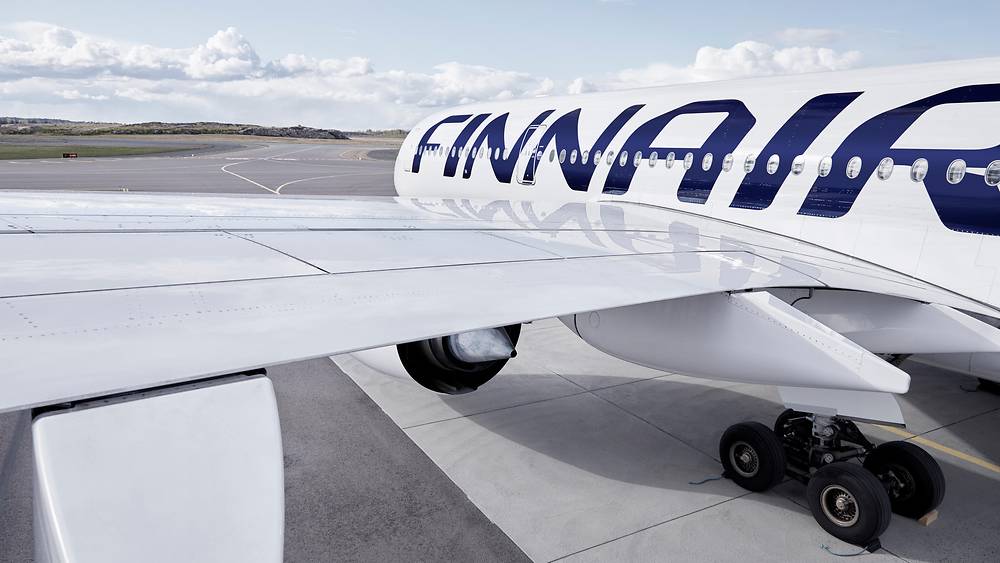Cargo news


Fuel efficiency improvements across operations
Finnair is developing fuel efficiency by making improvements across ground, flight and technical operations. With a broad scope of activities, the cumulative effect of decreasing fuel consumption is considerable.
Tom Hakala, Technical Pilot and Antti Levo, Business Analyst are two of the many Finnair experts working to improve fuel efficiency.
- The work done for fuel efficiency is something that we all play a part in and work for in the entire company, Hakala points out.
In flight operations, one of the effective changes made is using only one engine in taxiing during both departure and arrival. This has become a standard procedure and creates considerable yearly fuel savings according to Hakala.
- By employing this practice, we can save up to 100 kg of fuel with one wide-body aircraft flight.
Optimization and clever data use also help create savings. Cockpits now have better optimization tools, enabling the pilots to optimize altitude and speed according to fuel use data. Another example of data use is the visibility pilots now have on delay costs. The pilot can consider whether a delay is more sustainable than trying to catch up with the flight schedule using more fuel in the process.
Finnair is also now working in tighter cooperation with air traffic control Fintraffic ANS. The goal is to find bottlenecks in air space or air traffic control procedures.
- This cooperation has great potential and Fintraffic ANS is equally committed to sustainability objectives as we at Finnair are, Hakala says.
Efforts to decrease aircraft weight
In ground operations, there are several initiatives to decrease aircraft weight. For example, the amount of potable water carried is now estimated more accurately using dynamic optimization.
- Using data, we can dive deeper into how much water is used on each flight according to flight duration and number of passengers, Levo says.
Similar kinds of savings can be achieved by avoiding tankering, a practice of excess fueling for the return flight. Sometimes tankering is still needed, for example, due to fuel availability but carrying excess fuel is now minimized.
One of the initiatives under consideration at the moment is decreasing the use of aircraft’s auxiliary power units (APUs) to provide electricity and air conditioning when the aircraft is parked. According to Hakala Finnair is now starting to analyze to find out how often aircraft’s auxiliary power units are used unnecessarily.
- It is also important that our ground handling agreements are up to date so that we can utilise electricity and air conditioning provided at the destination, Hakala points out.
Weight is also a consideration in cargo operations. For example, pallet weights and cargo balancing are looked at more carefully. It is also important that the estimated cargo weight is as correct as possible before planes are fueled.
Inside the cabin, small changes decrease the overall weight. Cabin carpeting is being changed to a lighter-weight option and small extras such as old narrow body screens and inflight magazines are removed. Even possible excesses in catering weight are being looked at.
Flight planning and technical operations have important roles
One of the key areas of improvement in flight planning is the optimization of which aircraft to use on which flight. These are changed dynamically whenever possible so that the most efficient plane type is used to reach the best performance.
- Even within the same aircraft type newer models can be more efficient so prioritizing the use of those is sensible, Levo mentions.
- In technical operations, fuel efficiency can also be improved by regular engine wash. We are also looking at ways to decrease friction of the airflow around the aircraft with surfacing material and by making sure that control surfaces of the aircraft are always setup optimally, Hakala mentions.
Finnair is making an effort to review its operations continuously and actively search for new initiatives to increase efficiency, cut emissions and costs.
- We have now picked the low-hanging fruits, which means that in our further actions, we must reach higher and higher, Hakala finishes.